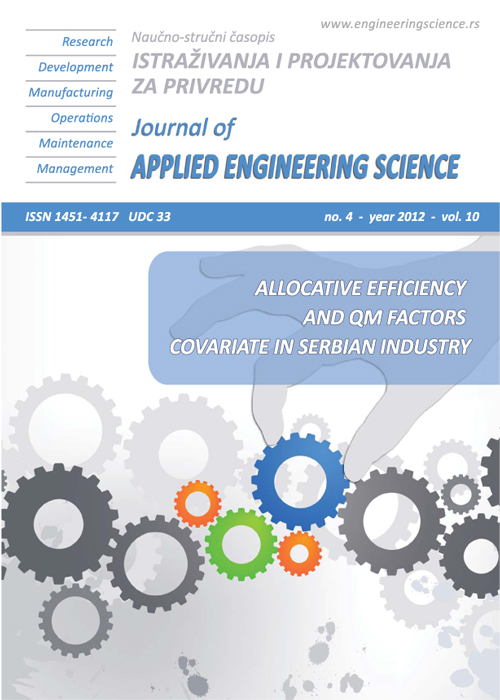COMBINATION OF KNOWLEDGE IN THE SYSTEM SUPPLIERS - MSP - CUSTOMERS IN THE TRANSITIONAL ECONOMY ENVIROMENT IN SERBIA
Abstract
The paper presents the results of research of the combination of knowledge in the system: suppliers - SMEs - consumers in case of SMEs in Eastern Serbia. A theoretical model of a combination of knowledge was established in the investigated system. By using the statistical analysis of the results a satisfactory statistical significance of acquired results was determined, which allowed the testing of the defined model using LISREL software package. The results show the importance of the established hypotheses for the impact of the cooperation with suppliers on a combination of knowledge, as well as the combination of knowledge of customers and suppliers on the creation of the new knowledge in SMEs. The hypothesis about the positive influence of the sharing of knowledge with customers on the combination of the knowledge in SMEs has not been proven. These facts suggest that SMEs in Serbia do not collaborate with their customers. The cause of such a situation is the lack of system quality (SQ) in the SME sector in Serbia, as well as not applying the principles of TQM practices, which provides the best explanation of the short life cycle of SMEs in Serbia and the inability of their internationalization.
Keywords: SMEs, customers, suppliers, knowledge combination, LISREL
References
Acs., Z.J., Dana, L.P., Jones, M., (2003) Toward
Audretsch, D.B., Thurik, A.R., (2000) Capitalism
Benzing, C., Chou, H.M., Shabo, B., (2005) Hungarian and Romanian enterpreneurs in Romania – motivation, problems and differences, Journal of Global Busines, 16: 77-87.
Benzing, C., Chu, H.M., Kara, O., ( 2009) Journal of Small Business Management, Enterpreneurs in Turkey: A factor analysis of motivations, Success factors and problems, Journal of Small Business Management 47(1): 58-91.
Bolomstermo, A., Eriksson, K., Lindstard, A., Sharma, D., (2004) The percieved usefulness of network experimental knowledge in the internationalizing fi rm, Journal of International Management , 10(3): 355-374.
Bou-Luslar, J.C., Escrig – Tena, A.B., Roca- Puig, V., Beltran – Martin, I., (2009) An
Cegerra – Navarro, J., (2007) Linking exploration
Crick, D., Jones, M.V., (2000) Small hightechnology
Crombach, J.I., (1951) Coeffi cien aplha and
Dyer, J.H., Nobeoka, K., (2000) Creating and managing a high –performance knowledge – sharing network : the Toyota case, Strategic Management Journal, 21(3):345-368.
Ho, R., (2006) Handbook univariante and multivariante data analysis and interpretation with SPSS, Central Queensland University Rockhampton, Australia
Jarzabkovski, P. And Wilson, D.C., (2006) Actionable strategy knowledge: A practice perspective, European Management Journal, 24(5): 348-367.
Kale, P., Singh, H., Perlmutter, H., (2000) Learning and protection of proprietary assets in strategic alliances: bulding relational capital, Strategic Management Journal, 21, 217- 237.
Kayank, H., (2003) The relationship betwen total quality management practices and their effects on fi rm performance, Journal of Operations Management 21(4), 405 – 435.
Knight G.A., Cavusgil, T., (2004) Innovation
Moen, O., (2002) The born globals: A new generation of small European exporters, International Marketing Review, 19: 156 – 175.
Molina, L.M., Montes, L.J., Moreno, A.R., Relathionship betwen quality management practices and knowledge transfer, Journal of Operations Management, 25: 682-701.
Moris, H. DeGroot, Mark S. Schervish (2002) Probabiolity and Statistics, Addison – Wesley, p.485.
Omerzel, G.D., Antončič, B., (2008) Critical enterpreneur knowledge dimensions for SME performance, Industrial Management & Data systems, 108(9): 1182 – 1199.
Rialp, A., Rialp, J., Knight, G.A., (2005) The
Soda, G., Usai, A., Zaheer, A., (2004) Network memory: the infl uence of past and current networks on performance, Academy of Management Journal, 47(6): 893-906.
Street, C.T., Cameron, A.F., (2007) External relationchips and the small business: a review of small business alliance and network research, Journal of Small Business Management, 45(2): 239 - 266.
Tari, J.J., Molina, J.F., Castejon, J.L., (2007) The realatonship between quality management practices and their effects on quality outcomes, European Journal of Operational
Thorpe, R., Holt, R., Macpherson, A., Pittaway,
Tolstoy, D., (2009) Knowledge combination in a foreign-market network, Journal of Small Business Management, 47(2):202-220.
Uzzi, B., Lancaster, R., (2003) Relational emeddedness and learning: the case of bank Loan Managers and thier clients, Management Science, 49(4): 383-399.
Zahra, S.,Matherne, B., Carleton, J., (2003) Technological resource leveraging and the internalisation of new ventture, Journal of International Enterpreneurship, 1(2): 163- 186.

